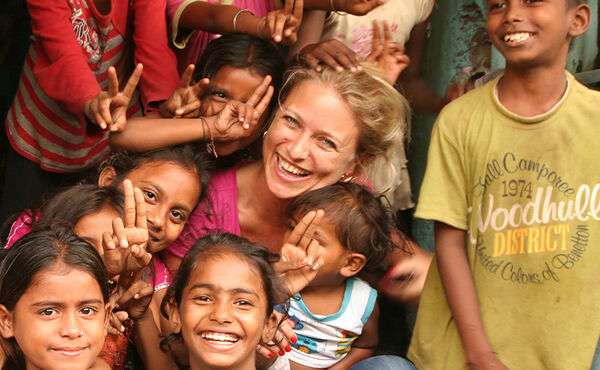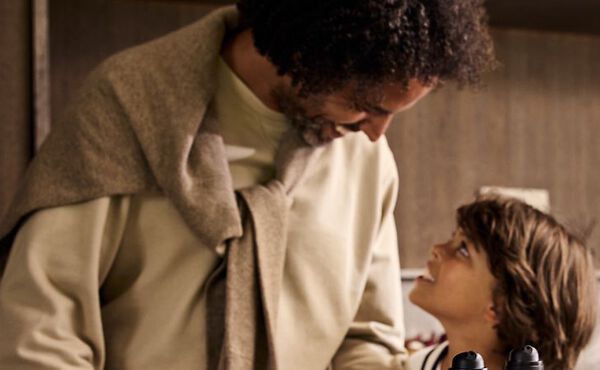What is happiness? And importantly, how can we capture those warm feelings of contentment to feel happier every day? A new wave of happiness experts may have the answers.
Happiness is something we all crave, we all want to feel good, but before we focus on how to feel happy, it’s important to understand just what it is we’re pursuing.
WHAT IS HAPPINESS?
For Mo Gawdat, Rituals resident happiness expert and author of Solve for Happy, there’s a simple formula for happiness that we can all employ. The happiness equation, as Gawdat calls it, is this: when your expectations are equal to, or less than, the reality of events, then you’re opening yourself up to feeling happy. In other words, our happiness is all in our perception of events, and the key is to focus on building a more positive outlook. At Rituals we see happiness as that burst of good vibes you experience when something great happens. Joy, on the other hand, it that contentment we feel when the world is on our side and everything is good.
For a deeper dive into the scientific side of happiness we consulted with Rosie Peacock, a positive psychologist and mindset coach. “Happiness is an umbrella term that positive psychologists break down into two distinct types of wellbeing,” explains Peacock. “Eudaimonic wellbeing, which refers to satisfaction in your life long term, and hedonic wellbeing, which refers to positive emotions in the here and now.”
While it’s important to pay attention to both of these happiness components to feel true contentment, many of us, notes Peacock, tend to focus solely on what feels good in the present moment rather than planning for long-term happiness, that deeper feeling of joy.
Jaron Soh, co-founder & CEO of Voda, an LGBTQIA+ mental wellness app powered by leading psychotherapists, has found the same to be true. For Soh he notes our goal should be to live in alignment to our values. “This is when we're living a life that is meaningful, purposeful and fulfilling to us,” he adds.
IS HAPPINESS A CHOICE?
As many of us may know, choosing to perpetually look on the bright side and adopting a ‘come what may’ attitude to life can be difficult. Which prompts the question, is happiness really a simple choice? For both Peacock and Soh, the answer is – not completely.
“There is a theory in positive psychology called the hedonic treadmill,” says Peacock. “What this means is our positive and negative emotions will fluctuate based on our life experience, but after a short time they return to the same set point.”
Peacock cites a 1978 study involving lottery winners and accident victims, which sought to answer the question of whether happiness is relative. “The study found that after some time passed, lottery winners returned to the same emotional baseline as before they had won the money. This is why for long lasting happiness we need to look beyond positive emotions alone, and towards creating meaning and overall life satisfaction.”
Soh agrees, adding that the pursuit of a constant state of joy is one of the biggest misconceptions about finding true happiness. “The truth is that it’s normal to have low days, and to experience negative emotions like sadness, anger and stress. It’s important to recognise that happiness is not a destination to be reached, but rather a journey that involves both positive and negative experiences.”
CAN I BE HAPPY ALONE?
In short, yes you can indeed be happy alone, and according to master life coach Lydia Kimmerling, also known as The Happiness Explorer, it all starts with being happy with yourself.
“You are never truly alone when you become your own best friend. If you struggle with loneliness, it may be a sign to start improving the relationship you have with yourself,” explains Kimmerling.
“It's very normal to crave intimacy and connection and learning how to be happy alone is certainly not about never wanting or needing this. However, if you currently don't have this, then it's a great opportunity to start working on yourself. Now is the time to really get to know yourself and pour all of your attention and focus into you, what you love and what makes you happy.
“When you create a deeper connection with yourself, you’ll love yourself more and feel more connected to you – it’ll also lead to feeling less lonely, and happier with yourself.”

EXPERT TIPS TO FEEL HAPPIER
So, we’ve explored just what happiness is, along with the importance of combining those present moment feelings of positivity, with goals and values that’ll bring us long-term satisfaction. Now it’s time to look at a few tips and techniques that our experts use to help them along the happiness journey – remember, it’s about finding happiness in the process rather than seeing it as an end destination.
#1: SET YOUR GOALS
“One of the best ways to boost long-term happiness is to focus on setting intrinsic goals – these are goals set around enjoying the process, rather than just the end result,” says Peacock. “So, for example, this might be to have as much fun as possible moving your body every day, rather than the goal of getting a bikini body for summer.”
#2: TRY A GRATITUDE JOURNAL
Along with setting goals, Peacock advises using gratitude practices that can help shift our focus onto appreciating and enjoying what we do have, rather than dwelling on what we don’t.
“Gratitude practices have been scientifically proven to boost happiness really effectively, so grab a journal and before you go to sleep each night, write down three things you are grateful for. This should help you see a huge boost in your contentment.”
Shop our Gratitude journal here.
#3: THE HAPPINESS SWITCH ON
“I like to ask my clients to do a daily happiness switch on,” says Kimmerling. “This is a routine that includes asking yourself three questions as soon as you wake up. Setting your intentions like this helps to interrupt any negative directions that your thoughts may automatically drift towards, and take charge of the day ahead.”
Try these questions:
- Who do I want to be today?
- What do I want to think?
- What am I going to do?
#4: CLARIFY YOUR VALUES
“I find that a values clarification exercise can be effective for individuals who are struggling to find happiness, but lack understanding as to why they might be feeling this way” says Soh.
“This exercise involves first reflecting on one's core values, such as honesty, compassion, or creativity. We then consider how these values can be lived out in daily life, and take steps to make changes in our lives or relationships based on whether we are living in alignment with our values.”
Want to discover more secrets about happiness? Join the Rituals Happiness Challenge, with Mo Gawdat. It’s a 14-day interactive journey that will transform your life and help you find true, long-lasting happiness.







